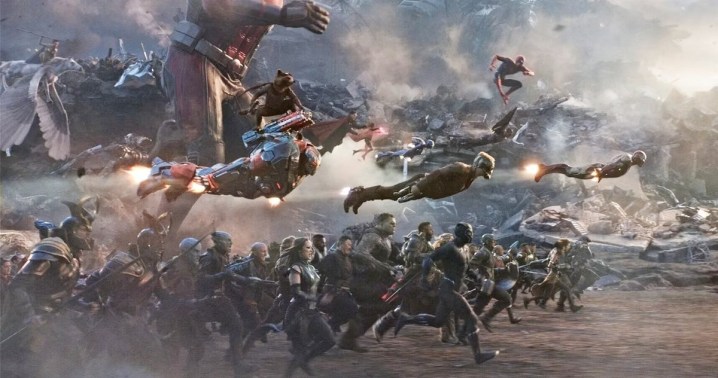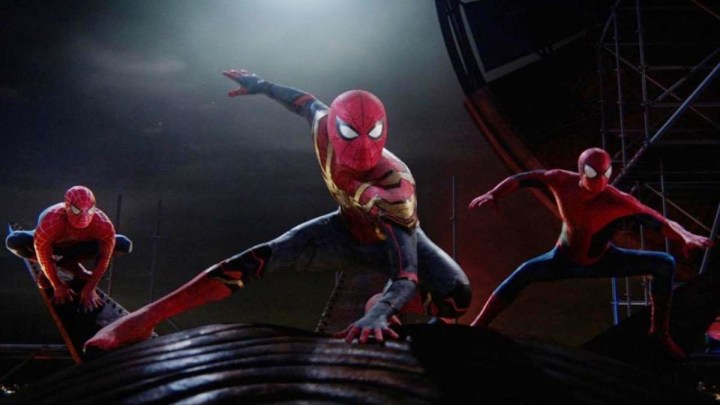
Somewhere, Lex Luthor is smiling. Superheroes, the bane of his villainous existence, are having a rough year at the multiplex. The Flash stumbled hard. Shazam! Fury of the Gods fizzled. Ant-Man and the Wasp: Quantumania opened big, then fell fast. Will Blue Beetle reverse the trend? The $30 million it’s expected to make this weekend isn’t so bad for a film originally intended to go straight to streaming, but still pretty dire for something that cost four times that.
Not every splash panel spectacle has underperformed. Guardians of the Galaxy Vol. 3 made about what its predecessors did, while Spider-Man: Across the Spider-Verse is as successful commercially as it is creatively. But even those hits have been dramatically outgrossed by the likes of The Super Mario Bros. Movie and Barbie — just as last year’s crop of comic book fare fell very shy of the numbers posted by Top Gun: Maverick and Avatar: The Way of Water.
Is the age of the superhero over? Much as that would please cinephiles fed up with the wham-pow of Marvel and DC, it’s probably too soon to fly any capes at half-mast. But there’s no denying that, after a couple decades of dominating popular culture, superhero movies seem to be losing their iron grip on the public’s pocketbooks. They’re performing, these days, like any other kind of movie: Audiences see the ones they’re interested in, skip the ones they’re not interested in, and file others in their proverbial “wait until streaming” queues. This is the year, in other words, that people stopped treating superhero movies like events.

A steady descent
It’s been all downhill for the genre, in terms of sheer conversation-monopolizing popularity, since 2019. Arguably, that’s when superhero movies hit their cultural peak. Avengers: Endgame fulfilled its destiny as the commercial apotheosis of the Marvel crossover project, seemingly assembling every person with even the most passing interest in costumed titans under one ticket-buying tent. DC, meanwhile, after years of trying to mimic Marvel’s extended-universe strategy, found big success with less tightly connected vehicles as its main attractions: Aquaman swam to a massive billion-dollar haul globally in 2019, as did Joker, which became an award-winning phenomenon, even picking up the top prize at the Venice Film Festival.
There have been hit superhero movies since; Batman and Wakanda can still put butts in seats, go figure. But only one of them, Spider-Man: No Way Home, has truly been a sensation, drawing massive crowds for weeks on end. Has the supply of CGI slugfests finally exceeded demand for them? The genre’s recent downtrend is more complicated than people getting sick of superheroes. It probably has more to do with the changes in the industry that COVID hastened — including, especially, the increased blurring of lines between theatrical and streaming movies. To paraphrase Norma Desmond, maybe the Avengers are still big, and it’s the screens that got small.
Both Marvel and DC kept their brands alive during the pandemic with simultaneous theatrical/streaming releases of Black Widow and Wonder Woman 1984, respectively. But they also opened a kind of Pandora’s box: While big superhero movies have returned to opening exclusively in theaters, the window between their theatrical runs and their streaming premieres has shortened. Have audiences made peace with waiting a little while to see a new superhero movie? Worse, have they actually become accustomed to seeing these movies on their TVs, and even realized how little difference the Dolby experience makes for many of them? Thor: Love & Thunder and Black Adam are the definition of rentals at best.

Glorified TV
Marvel, especially, has long been preparing its audiences to look at superhero movies as glorified television. For a while, that was great for business: By constantly connecting to other installments of the franchise, every MCU entry became a necessary piece of the puzzle — a semiannual episode you had to catch to follow the larger story. (It’s partially how it turned second-stringers like Ant-Man and the Guardians into movie stars.) But Endgame functioned so well as a logical, well, ending to the story being told that the movies since have struggled to maintain the illusion of appointment viewing. It doesn’t help, of course, that the general quality of these movies — and especially their effects work— has dipped these past few years.
Anyone who’s ever started to give up on a once-favorite TV show that’s blown past its sensible finale knows what happens next: You fall behind and the time commitment to catch up starts eclipsing your interest in doing so. In Marvel’s case, the problem is exacerbated by the ways the studio has started tying its actual TV so closely to the movies, so that now you have to binge nine episodes of WandaVision to keep up with the Doctor Strange sequel, or make time for the Guardians of the Galaxy Christmas special to clock all the relevant relationships in the new movie. (DC doesn’t have this problem as much. If only it could make standalone films people actually wanted to see.)

Enthusiasm wanes
People talk all the time about supposed “superhero fatigue,” the sense that Hollywood is fast exhausting the appeal of stories ripped from panels. But when it comes to how audiences are receiving these movies in 2023, it seems less a matter of being tired of them than having a bit less enthusiasm for them. What once felt like something viewers would race out to see has become something they’ll see eventually, probably in their living room, on their own timeline. And that’s directly related to how both Marvel and DC have treated cape-and-cowl fare like content, like grist, not like something special. No wonder audiences don’t see superhero movies as events anymore. They’re not.
Endgame was a once-in-a-generation phenomenon that has, in a way, made the genre feel smaller. Marvel and DC will doubtlessly continue to chase the zeitgeist-touching success of that movie, with the mixing-and-matching franchise possibilities of the Multiverse as the conduit to similar dopamine hits. But the generally diminishing returns of this year’s batch of superhero stories — including a few that leaned heavily on the Multiverse — suggests that it may take more to dominate the public imagination in that way again.

For a superhero movie to become a true event once more, it might need to feel new or different — the way Black Panther or The Dark Knight or the first Spider-Verse movie did. Audiences love a winning formula, but that craving for the familiar can be overstated. Just look at the monster success of Barbie, which doesn’t much resemble anything else on the box-office charts and is doing record-breaking business because of it. Superhero movies will probably keep making money (and, sometimes, losing it), but they may have to break through the machine-tooled lethargy of their current form to fully command the scattered attention of a moviegoing world again.
Failing that kind of blazingly new vision, studios might at least want to start thinking about the kind of money they’re blowing on cape stuff. A couple weeks in, another of this year’s superhero movies, Teenage Mutant Ninja Turtles: Mutant Mayhem, has crossed $75 million domestically — which would be a disaster if it cost what The Flash did and not roughly, well, $75 million. Superhero movies don’t have to be events — except they sort of do when they cost enough to raise Bruce Wayne’s eyebrows.
For more of A.A. Dowd’s writing, please visit his Authory page.



